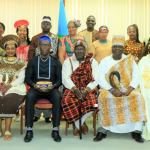Contribution of nurses to COVID-19 response receives high praise

(CARICOM Secretariat, Greater Georgetown, Guyana) The valiant contribution of nurses to the Community’s response to the COVID-19 pandemic was strongly applauded at the recently held 49th Annual General Meeting of the Regional Nursing Body.
Director of Human and Social Development of the Caribbean Community (CARICOM) Secretariat, Ms. Helen Royer, and the Chair of the Regional Nursing Body (RNB), Ms. Margaret Smith gave the acknowledgement as the RBN held its first face-to-face meeting in two years, in Georgetown, Guyana, 19-21 July.
Ms. Royer said the COVID-19 pandemic placed the spotlight on nurses and midwives, through whom lives were saved because of their dedication, knowledge, skills and leadership in health administration, health care, health promotion, and emergency response.
“We witnessed your tireless efforts, sleepless nights, and in some cases, neglect of your family, especially in times of crisis, and we applaud you,” Director Royer stated.

Chair of the RNB, Principal Nursing Officer of Antigua and Barbuda, Ms. Margaret Smith, said that despite limited human resources for health during the acute phases of the pandemic, nurses “worked valiantly.”
“It is important that we honour all health care workers for the achievements made, but especially our nursing colleagues who have demonstrated how invaluable a resource nurses are to the health system’s resiliency,” Ms. Smith said.
Describing nurses as “indispensable pillars” supporting healthcare systems through very challenging times, she expressed appreciation for their “unwavering dedication in the fight against this deadly health emergency.”
She said while it was well established that up to 80% of primary health care can be delivered by nurses, their role in the COVID-19 pandemic proved that “without a doubt.”
“They are the true unsung heroes on the front lines of disease prevention and care,” Ms. Smith said, adding that investment in nurses and midwives “is good value for money.”
She urged nurse leaders to advocate for the strengthening of Nursing and Midwifery through the implementation of the Global Strategic Directions for Nursing and Midwifery (SDNM) 2021-2025, as well as the Regional Nursing Body’s Strategic Plan for Nursing and Midwifery 2020-2024.
The RNB meeting highlighted priorities for advancing Nursing and Midwifery in CARICOM. With some delegates participating virtually, the Meeting also examined the enhancement of the Caribbean Examination Council (CXC)-managed Regional Examination for Nurse Registration (RENR), climate change and its implications for nursing and nursing education, vaccine hesitancy among health care workers, and task shifting in the profession.
At the meeting, the Pan American Health Organisation (PAHO) sounded the alarm that routine childhood vaccination coverage has recorded a significant decline. With this trend, PAHO said there is a risk for the importation of vaccine-preventable diseases like measles and polio.
PAHO’s Advisor on Immunization for the Caribbean Sub-region, Dr. Karen Broome reminded the RNB that the target for childhood vaccination coverage is 95 percent and illustrated its concern about some countries not meeting that goal by noting that in 2018, two countries reported less than 90 percent in Polio 3 coverage, but in 2019, the number of countries doubled.
Dr. Broom noted that while some countries regained ground in 2020 and 2021, the very high vaccination coverage, which allowed the Region to gain recognition as a best practice for childhood immunization, is under threat.
Even as PAHO acknowledged the negative impact of the COVID-19 pandemic on the Expanded Programme on Immunisation (EPI) in the Caribbean Community (CARICOM), including the redeployment of the highly trained EPI personnel to COVID-19 inoculation efforts, the PAHO Immunization Advisor urged the RNB to commit to identifying and implementing innovative strategies to strengthen the EPI.
Task shifting and what it means for the Nursing and Midwifery profession were shared with the RNB by the Director of PAHO/World Health Organisation (WHO) Collaborating Centre for Advanced Practice Nursing, Jennifer Dohrn.
She noted that task shifting, which involves the redistribution of health tasks within workforces and communities, is important for reducing morbidity, mortality, and burden of diseases when a shortage or inaccessibility of high-trained health workers limits access to effective healthcare. Dr. Dohrn said that the WHO recommends the adoption of task-shifting as a public health initiative, within an enabling regulatory environment for implementation.
The RNB also received a presentation by the Chief Executive Officer of EarthMedic and EarthNurse Foundation for Planetary Health, Dr. James Hospedales, on the implications of Expanded Programme on Immunisation (EPI) on nursing and nursing education. The presentation highlighted the worsening impacts of climate change on patients and communities. It served as the backdrop against which the RBN committed to developing guidelines for capacity building for nurses to address cross-cutting climate change and health issues.
Source: CARICOM TODAY









 Next Post
Next Post